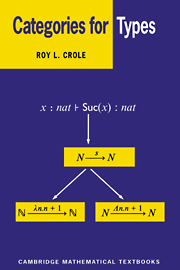3 - Algebraic Type Theory
Published online by Cambridge University Press: 05 June 2012
Summary
Introduction
Discussion 3.1.1 The fundamental idea of algebraic type theory is to provide a formal framework for reasoning using the usual rules of equality. Simple algebraic type theory is far removed from the syntax and rules of real programming languages, but it is a good starting point from which to motivate and explain the ideas of categorical semantics. To a first approximation, algebraic type theory involves three entities, which will be called types, terms and equations. Think of a type as a collection of items (terms) having some common property, and an equation as a judgement that any two items (terms) are essentially the same. We aim to define the notion of a theory in algebraic type theory. Recall that the general idea of a theory is that one has some basic assumptions, usually referred to as axioms, and some rules for deducing theorems from the axioms. Thus a theory in algebraic type theory consists of a given collection of types, terms and equations, where the equations are the axioms of the theory. The theorems are the equations which one is able to deduce from the axioms using the rules of algebraic type theory. These rules say that equations may be manipulated according to the rules of reflexivity, transitivity and symmetry. So, for example, if a term t equals a term s, then we may deduce that the term s equals the term t, and this is the idea of symmetry.
- Type
- Chapter
- Information
- Categories for Types , pp. 120 - 153Publisher: Cambridge University PressPrint publication year: 1994



